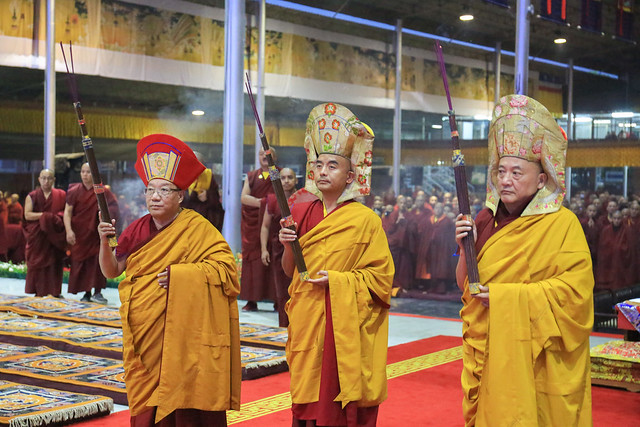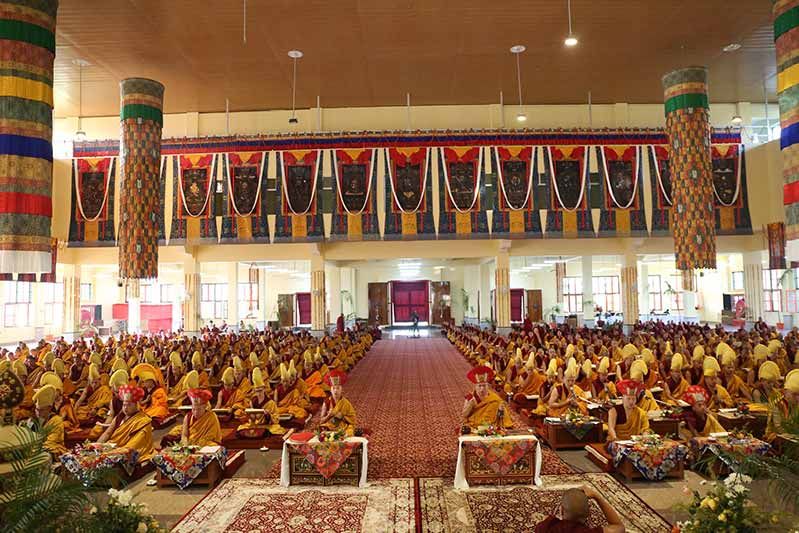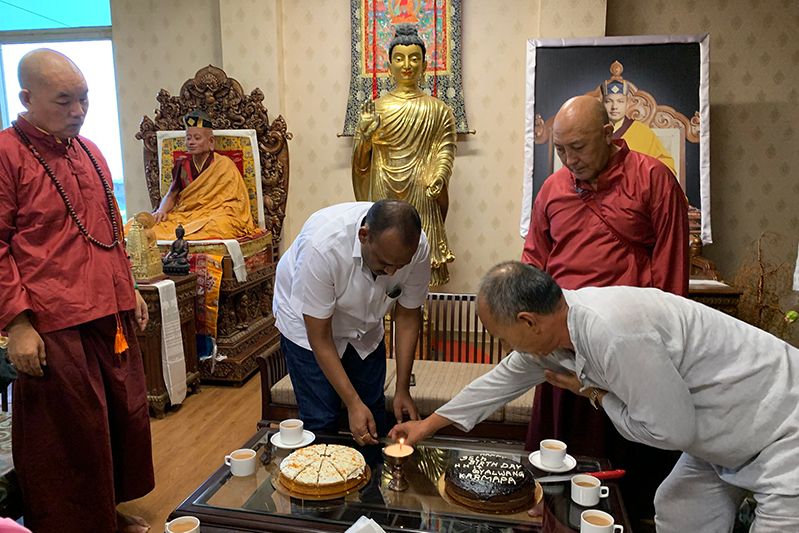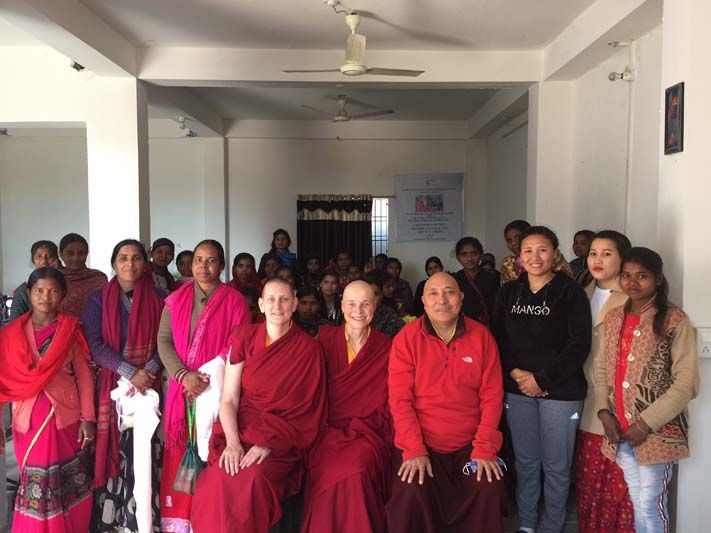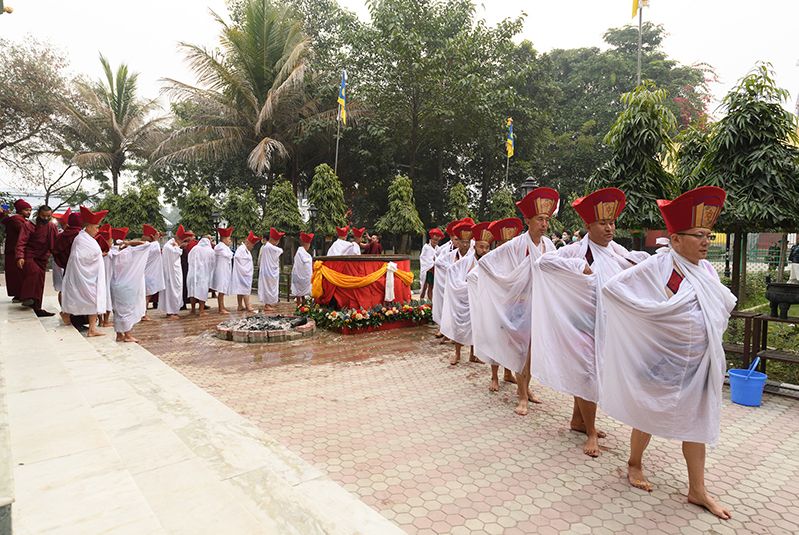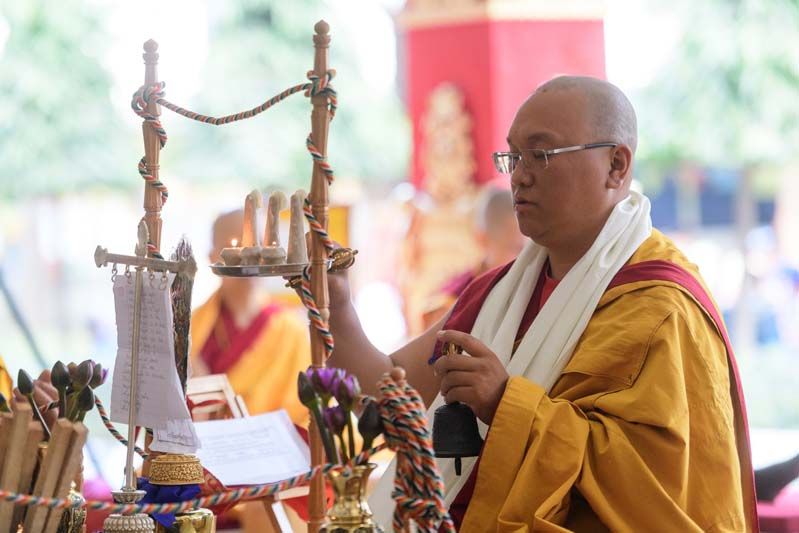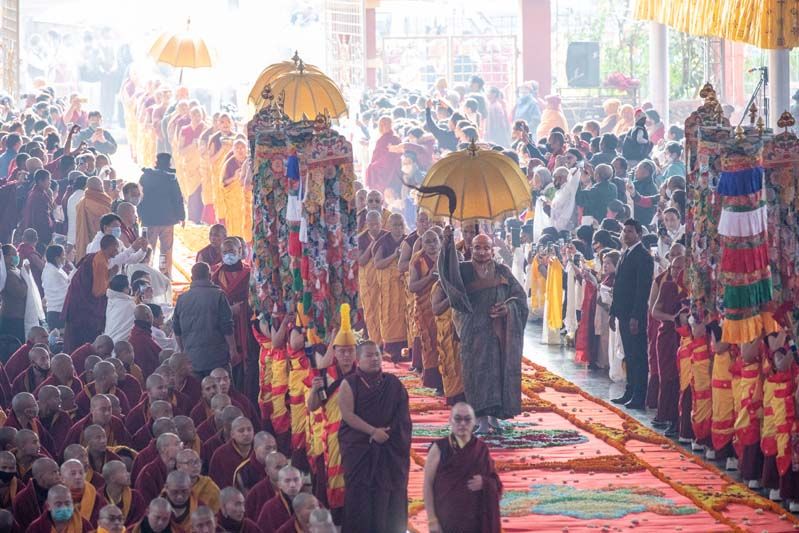Two Evenings of Western-style Debate
- January 16, 2019
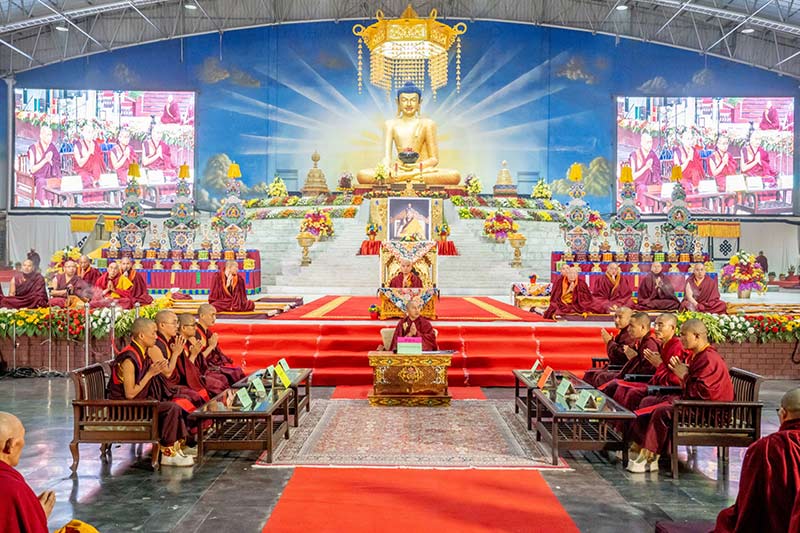
Monlam Pavillion
January 16, 2019
In order to fulfil and uphold His Holiness Gyalwang Karmapa’s intentions to benefit the Dharma, on the second and third evenings of the 36th Kagyu Monlam, sixteen monks from eight different shedras engaged in Western-style debates. The first night addressed the question of, “Is it proper to rely on worldly deities as a refuge?” and the second, “Is practice more important than study?”
Following a discussion among shedras, they decided that there were five purposes to having these debates. These included:
1) introducing monastic and lay members to specific quotes of the Buddha;
2) sharing knowledge with others;
3) using the opportunity of this large gathering which is vast like an ocean for sharing Dharma;
4) propagating the benefits of studying Tibetan as a primary language for spreading the Dharma, and
5) having actual benefits arise from hearing the arguments for and against these different topics.
The debate adjudicators, Khenpo Kelsang Nyima and Khenpo Karma Tseten, both of Rumtek Shedra, noted that these were not traditional Tibetan-style debates, but framed around a discussion where there were two positions argued by two teams of four monks each with specific set time limits. While the format was not typical of Tibetan debates, these discussions did, in fact, integrate debate elements such as supporting claims with direct quotations from the Buddha, citations drawn from scholars, and one’s own logic and intelligence. As Khenpo Karten noted, “We are all disciples of the Buddha, so we should be refined in our conduct.”
Both evenings were filled with lively discussions, one side arguing against the other amid set time limits. For instance, on the second night, Karma Gyatso, started off the discussion saying that, “It is very clear to see that practice is more important than study. For instance, when the Geshe asked Milarepa whether he was able to understand the Dharma, due to Milarepa’s practice, he was able to subdue the Geshe.” The logic of his argument continued – the best way to practice the Dharma is to think about impermanence. Further, enlightenment biographies are based on ultimate realization through practice, not study. He concluded his argument by drawing from the preliminary teachings from His Eminence Sangye Nyenpa Rinpoche who taught that “we need to join all of the Dharma to our being.”As Karma Gyatso said, “we can act like we are studying and we can act like we are praying, but it can be a great fault if these are not actually practiced. Therefore, practice is ultimately more important than study.”
From the side of the proponents for study, Yeshe Jangchup noted that while both study and practice were important, study must precede practice because if there is no cause, how can you get the result? As he noted, we have to support our arguments with knowledge of the shastras and scripture. While we recognize practice is necessary, he asserted, the root is studied under all circumstances. He used the metaphor of a house needing a foundation. To further support his claims, he drew from the Buddha’s teaching on the three types of wisdom: listening, reflecting, and meditating. The first of these is listening and study. He then quoted Sakya Pandita who noted that if a foolish person practices Mahāmudrā, this person will be reborn as an animal. Having cited Nagarjuna, Yeshe Gyatso then turned to Tsongkhapa who said that diligent study precedes confidence which comes before practice.
The discussion continued in this manner. Where the first two speakers were allotted ten minutes, the subsequent discussants had four minutes each to assert their claims. For instance, Karma Norbu advocated that practice was more important insofar as generating and practicing the mind of renunciation is key for taming the mind. For the side of study, Dudrup Khenpo asserted that study and reflection were the principal causes. As he said, “if we want a result without a seed, the fruit will not grow.” He referenced Sakya Pandita who said that mediating without learning is like climbing a cliff without arms and legs. Returning to the proponents of practice, Karma Chokyi Yeshe said that merely studying Buddhist texts one’s entire life without practice is a complete waste. Then Chokyi Drukpa contested this point by saying, “Of course, practice and study are indispensable, but first we have to rely on reasoning and scripture.” Karma Ngodrup concluded this first round in support of practice with the counter-argument that even if a scholar is well-trained in the three baskets, there are no signs of benefit without practice just as if you have a field that yields no crops. Concluding the round for the team in support of study, the last participant contested a previous point that the Kagyu lineage is a practice lineage. He asserted that there are in fact eight different practice lineages and that practice is not merely special to us. We are all beginners so we must emphasize study, he insisted.
A second round began in which each of the eight participants had one minute to make a lively, quick rebuttal. Often met with laughter, these quick arguments were straight to the point. For instance, from the practice side, one participant humorously pointed out that Milarepa, well known for his practice, attained enlightenment in one life whereas the Geshe who insisted on study is also the person who gave Milarepa poison. “Who would you want to follow?” he asked. From the study side, the final presenter quipped, “we couldn’t even have this debate without study!” This debate is based on the fact that we have studied and know the scripture and reasoning to make our arguments.
This was followed by a concluding round where one participant summarized and honed in on key aspects of their argument, advocating either practice over study or study over practice. No final conclusion was reached, but the vibrant discussion left attendees with lots to ponder as they continue with practice and study or study and practice. Gratitude was offered to His Holiness Gyalwang Karmapa for helping develop this program, for his compassion and guidance as well as for Goshir Gyaltsap Rinpoche and Mingyur Rinpoche, all the tulkus, khenpos, sangha, and lay members who came to hear the discussion. The discussions were undoubtedly successful and certainly met their five aforementioned purposes.
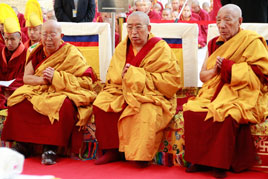
37th Kagyu Monlam Schedule
Tibetan / English / Chinese • French • German • Indonesian • Korean • Polish • Russian • Spanish • Vietnamese
Dharma Teachings
 Meditation Instructions
Meditation Instructions
Recorded during the 37th Kagyu Monlam, Bodhgaya, India. January 28-30, 2020.
